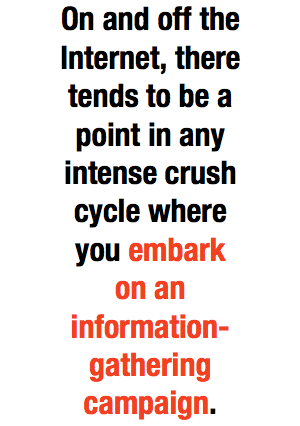Thanks to the Internet, we now have a host of new ways to offend, enrage, misinterpret, creep out, or alienate people. In the Tangled Web, we field your questions about how to be a decent human online. Have a question? Ask jess@dailydot.com.
So this girl, an acquaintance of my friend J., started flirting with me on Facebook. She is kind of an Internet celebrity and superduper cute, so needless to say I was flattered. How often is a schmuck like me presented with the opportunity to potentially date a real-life manic pixie dream girl who is ridiculously funny? And so what if she lives half the country away?
J., who is fully supportive of this misadventure, tells me that the girl messaged her and wants to know how we know each other. J. was deliberately vague, saying something like, “Oh, we went to school together.” The truth is, J. and I actually dated briefly once before. And, oh yeah, there’s this: she was the first person I ever had sex with. We remained good friends even after the romantic relationship fizzled out. Is this information I should volunteer to Manic Pixie Dream Girl? Or should I just lie? The truth might give off the impression that I’m still interested in J. or something. I don’t really know how I should proceed.
I definitely don’t think you need to worry about giving the impression that you’re still interested in your friend J.—it’s impressive enough that you still want to talk to the first person you slept with. I’d hazard that most people don’t. If that’s the way your crush’s brain goes, she’s maybe more of a maniac than a manic pixie dream girl.

On and off the Internet, there tends to be a point in any intense crush cycle where you embark on an information-gathering campaign. Offline, you might ask around about the person, probably thinking you’re being all smooth and subtle while everyone rolls their eyes at your terminal mentionitis. Online, you might creep their Flickr or Instagram, read old tweets, or Google them.
But the boundaries between these realms are porous. Unless you were, like, married before the Internet was invented, you’ve probably Googled your offline dates, perhaps extensively late at night with a bottle of wine. And if things go well and you friend each other on Facebook, you might have a hard time resisting going through all 600 of their photos. (If you have an easy time resisting things like this, you are a better person than me, and we probably won’t be friends.) Conversely, if you meet someone through Facebook who is RL friends with your RL friend, it stands to reason that you’ll ask a few probing questions in order to put together a fuller picture of what your crush is like offline.
In other words: Relax. It’s a good thing that Manic Pixie is asking J. about you—it means she wants to know more. You’re not required to volunteer anything that makes you uncomfortable, but this is also a good opportunity for you to put your best foot forward. There’s no real reason not to say that you dated for a little while but it didn’t work out and you stayed friends; staying genuine friends with your exes is a good look, and presumably it was a long time ago that you were romantically involved. Yes, this will probably send your crush back to J. in search of scuttlebutt, but is that necessarily bad? A trusted friend is unlikely to dish up embarrassing details (though it couldn’t hurt to have a confab with ahead of time to make sure you’re on the same page). If she supports the union, J. will talk you up without selling you out, and everybody wins.
You are, however, under no obligation to say who punched your V-card if that idea makes you squirrelly. Be aware, though, that “what was your first time like” is a conversation that sometimes comes up in longer-term relationships. You might be choosing between an awkward gchat now and some really awkward pillow talk later.
Jess Zimmerman has been making social blunders on the Internet since 1994. Most of her current interpersonal drama takes place on Twitter (@j_zimms).
Image via Venusbuzz.com


